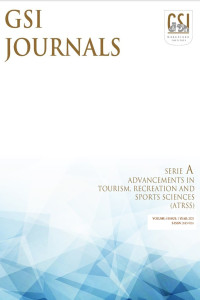Turizm - Rekreasyon Planlaması ve Coğrafi Bilgi Sistemleri İlişkisi Bağlamında Ülkelerin Akademik Yeterlilik Düzeylerinin Mekansal Analizi
Abstract
Bu çalışma, turizm ve rekreasyon planlaması ile Coğrafi Bilgi Sistemleri (CBS) arasındaki mekansal ilişkiyi incelerken, farklı ülkelerdeki akademik yeterliliği değerlendirmektedir. Sistematik bir literatür taraması kullanılarak, 2010 sonrası yayımlanan ve en az üç atıf almış akademik çalışmalar analiz edilmiştir; inceleme makaleleri çalışmaya dahil edilmemiştir. Bu çalışmaların verileri, yayımlandıkları ülkeler ve yazarların ait olduğu ülkeler baz alınarak organize edilmiş ve mekansal bir veritabanı oluşturulmuştur. Bu veritabanı, turizm planlaması ve CBS ilişkisine dair en çok atıf alan yayınların kökenini analiz etmeyi sağlamıştır. Veriler, CBS ortamına aktarılmış ve turizm ve rekreasyon planlamasında CBS uygulamalarının coğrafi dağılımını görselleştiren haritalar üretilmiştir. Çalışmanın bulguları, CBS'nin turizm planlamasında stratejik bir araç olarak en etkili şekilde kullanıldığı belirli ülkeleri vurgulamakta ve bu bölgelerde uzmanlık yoğunlaşmasını ortaya koymaktadır. Sonuçlar, CBS teknolojisinin bu alandaki önemini vurgulamakta ve daha geniş kullanımına yönelik stratejik öneriler sunmaktadır. Bu araştırma, CBS'nin turizm ve rekreasyon planlamasına entegrasyonu üzerine gelecekteki çalışmalara değerli bir temel sağlamaktadır ve bu sürecin planlama süreçlerini geliştirmedeki önemini vurgulamaktadır.
Keywords
Turizm Planlaması Rekreasyon Planlaması Coğrafi Bilgi Sistemleri Mekansal Analiz Akademik Yeterlilik
References
- Choo, Q. (2023). Systematic literature review on election and stock performance. Labuan Bulletin of International Business and Finance (Lbibf), 21(1), 61-77. https://doi.org/10.51200/lbibf.v21i1.4093.
- Jacobs, T., Robertson, J., Ham, H., Iwamoto, K., Pedersen, H., & Mantel‐Teeuwisse, A. (2019). Assessing the impact of law enforcement to reduce over-the-counter (otc) sales of antibiotics in low- and middle-income countries; a systematic literature review. BMC Health Services Research, 19(1). https://doi.org/10.1186/s12913-019-4359-8.
- Kitchenham, B. (2004). Procedure for undertaking systematic reviews. Computer Science Department, Keele University (TRISE-0401) and National ICT Australia Ltd (0400011T. 1), Joint Technical Report, 33.
- Samara, D., Magnisalis, I., & Peristeras, V. (2020). Artificial intelligence and big data in tourism: a systematic literature review. Journal of Hospitality and Tourism Technology, 11(2), 343-367. https://doi.org/10.1108/jhtt-12-2018-0118.
- Sop, S. (2020b). Self-congruity theory in tourism research: A systematic review and future research directions. European Journal of Tourism Research, 26, 2604-2604.
- Sop, S. A. (2020a). A systematic literature review on hotel design. Turizm Akademik Dergisi, 7(2), 297-310.
- Sulistyowati, S. & Ahmar, N. (2023). Moral disengagement and unethical behavior: systematic literature review. Jiafe (Jurnal Ilmiah Akuntansi Fakultas Ekonomi), 9(2). https://doi.org/10.34204/jiafe.v9i2.8474.
Spatial Analysis of Academic Competence Level of Countries Regarding Tourism - Recreation Planning and Geographical Information Systems Relationship
Abstract
This study examines the spatial relationship between tourism and recreation planning and Geographical Information Systems (GIS) while evaluating academic competence across different countries. Using a systematic literature review, original research papers published after 2010 with at least three citations were analyzed. The data were organized based on the countries of publication and authorship, creating a spatial database that enabled the analysis of the most cited publications on the tourism planning and GIS relationship. The data were then transferred into a GIS environment to produce maps to visualize the geographical distribution of GIS applications in tourism and recreation planning. The study's findings highlight that GIS is most effectively used as a strategic tool in tourism planning in certain countries, revealing a concentration of expertise in these regions. The results emphasize the significance of GIS technology in the field and offer strategic recommendations for its broader use. This research not only provides a valuable foundation for future studies on integrating GIS in tourism and recreation planning but also highlights its potential to enhance planning processes in the future.
Keywords
Tourism Planning Recreation Planning Geographic Information Systems Spatial Analysis Academic Competence
References
- Choo, Q. (2023). Systematic literature review on election and stock performance. Labuan Bulletin of International Business and Finance (Lbibf), 21(1), 61-77. https://doi.org/10.51200/lbibf.v21i1.4093.
- Jacobs, T., Robertson, J., Ham, H., Iwamoto, K., Pedersen, H., & Mantel‐Teeuwisse, A. (2019). Assessing the impact of law enforcement to reduce over-the-counter (otc) sales of antibiotics in low- and middle-income countries; a systematic literature review. BMC Health Services Research, 19(1). https://doi.org/10.1186/s12913-019-4359-8.
- Kitchenham, B. (2004). Procedure for undertaking systematic reviews. Computer Science Department, Keele University (TRISE-0401) and National ICT Australia Ltd (0400011T. 1), Joint Technical Report, 33.
- Samara, D., Magnisalis, I., & Peristeras, V. (2020). Artificial intelligence and big data in tourism: a systematic literature review. Journal of Hospitality and Tourism Technology, 11(2), 343-367. https://doi.org/10.1108/jhtt-12-2018-0118.
- Sop, S. (2020b). Self-congruity theory in tourism research: A systematic review and future research directions. European Journal of Tourism Research, 26, 2604-2604.
- Sop, S. A. (2020a). A systematic literature review on hotel design. Turizm Akademik Dergisi, 7(2), 297-310.
- Sulistyowati, S. & Ahmar, N. (2023). Moral disengagement and unethical behavior: systematic literature review. Jiafe (Jurnal Ilmiah Akuntansi Fakultas Ekonomi), 9(2). https://doi.org/10.34204/jiafe.v9i2.8474.
Details
| Primary Language | English |
|---|---|
| Subjects | Recreation, Leisure and Tourism Geography, Human Geography (Other), Policy and Administration (Other) |
| Journal Section | Research Articles |
| Authors | |
| Publication Date | February 28, 2025 |
| Submission Date | August 30, 2024 |
| Acceptance Date | October 24, 2024 |
| Published in Issue | Year 2025 Volume: 8 Issue: 1 |

